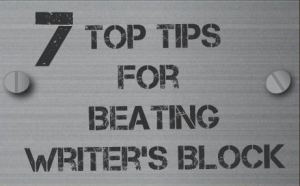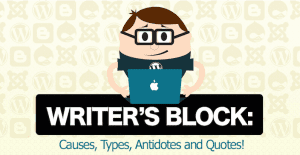Over the past week, I have struggled with a bout of writer’s block. After exhausting my repertoire of antidotes, I decided to research what works for others. I’ve assembled the best resources for overcoming writer’s block here. I share the best tip from each source from their recommendations, but there are plenty of other great ideas, so be sure to click through for more.
Update: Which tip helped me overcome my writer’s block the most? This one.
Quotes on Overcoming Writer’s Block
Writing about a writer’s block is better than not writing at all.
― Charles Bukowski, The Last Night of the Earth Poems
What I try to do is write. I may write for two weeks ‘the cat sat on the mat, that is that, not a rat,’…. And it might be just the most boring and awful stuff. But I try. When I’m writing, I write. And then it’s as if the muse is convinced that I’m serious and says, ‘Okay. Okay. I’ll come.’
― Maya Angelou via Goodreads
And if you’ve got a writer’s block, you can cure it this evening by stopping whatever you’re writing and doing something else. You picked the wrong subject.
― Ray Bradbury at The Sixth Annual Writer’s Symposium by the Sea, 2001
Infographics on Overcoming Writer’s Block
There are several infographics on writer’s block. I suppose there is a benefit to switching to the visual mode when the literary part of the brain is struggling. Here are a couple of the better ones:
Best Tip: Change the scenery.
If your current work location isn’t doing it for you, get off your butt and go somewhere else.
Best Tip: Eavesdropping, observe people in a park, write down what they do, what you imagine they are talking about.
Articles on Overcoming Writer’s Block
In addition, I found many articles and blog posts containing tips on overcoming writer’s block. Here are the most helpful:
Overcoming Writer’s Block [quickanddirtytips.com]
Best Tip: Don’t write the story yet. Write a memo to yourself about the story.
When you write to yourself, you lower your standards in a simple and productive way. Once your hands get moving on an informal draft, words begin to flow. The trick is to fool yourself into thinking that your story is something else: a memo, a journal entry, a letter, a note to a friend, a grocery list, anything that blows up the logjam.
Seven Writing Exercises to Get Your Creative Juices Flowing [flavorpill.com]
Best Tip: Body Language:
In this exercise you write out a scene, in which two or more characters communicate through body language, instead of regular verbal dialogue. For example your story can be about two strangers who catch each other’s eye at a party, they’re attracted to each other, what is their body language like and what non-verbal signals do they send each other. The story teaches us to sharpen our observation skills and makes us aware of how much we convey in our writing, and in real life, through non-verbal communication.
4 Unbeatable Ways to Fight Writer’s Block [helpingwritersbecomeauthors.com]
Best Tip: Show up every day.
Inspiration flows best when it flows regularly. Make it a point to sit down every single day for an allotted amount of time. Write even when you don’t feel like it. Treat it like a job and don’t cut yourself any slack. The muse only inhabits minds that are ready and waiting for it, and if you’re not writing, then you’re not ready.
27 Wacky Ways to Beat Writer’s Block [boostblogtraffic.com]
Best Tip: Curse like a sailor.
Feeling a little frustrated?
Well, let it out.
Before you start writing, curse like a sailor. Get angry. Be emotional.
Write something you’re passionate about. Have a good rant. Don’t worry about going too far.
Good writing isn’t about picking the right words. You need to make your audience feel something. Inspire them.
Writing is emotion.
Sure, you’ll have to edit your first draft. You might even decide to toss it.
Just remember: you can correct mistakes in a passionate piece of writing, but you can’t add emotions to a flat post. So, let it rip.
Don’t Wait for Inspiration: 3 Surefire Ways to Beat Writer’s Block [thewritelife.com]
Best Tip: Practice writing by keeping a journal.
Writing a journal will foster your creativity and give you space to develop ideas that you don’t have room for elsewhere. Journaling can help you turn thoughts and feelings into words and ideas.
Videos on Overcoming Writer’s Block
FAST Screenplay: Writer’s Block Instant Cure
[Note: This helped me more than all the others.]
Best Tip: Give yourself permission to write garbage.
Suzie Carr: 5 Ways to Boost Writing Mojo
Best Tip: Indulge your senses.
Do something that puts you in a scene in your book. What does the smell remind you of? What about the view? If you could taste the setting, how would you describe it?
Summary
Assembling these tips on overcoming writer’s block has me charged up. I can’t wait to get back to my writing.
If you have your own solutions to overcoming writer’s block, be sure to share them in the comments below.
Comments
Related Posts

Overcome Writer’s Block By Sharpening Your Vision
When I find myself sitting staring at the display, or pressing the backspace key in equal proportion to other keys, I’ve often found my block is due to the lack of clarity in the scene I am attempting to describe – or, sometimes it’s because my gut is telling me my approach to the scene isn’t right.
Here is how to break through.

Optimal Word Count for a Novel Manuscript
Whether you hope to get published the traditional way or plan to self-publish, the word count of your completed work is important. Here’s the scoop.

Pantser to Plotter
My brother wrote, “I’m a pantser. My guess is that you’re a plotter.” He was only partly right. Things aren’t always black or white.

Types of Foreshadowing (with Examples)
Foreshadowing is an essential ingredient in any good story. There are many ways authors foreshadow. Here are different types of foreshadowing with examples.




0 Comments